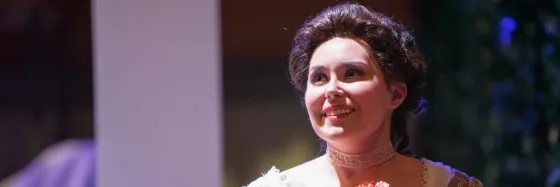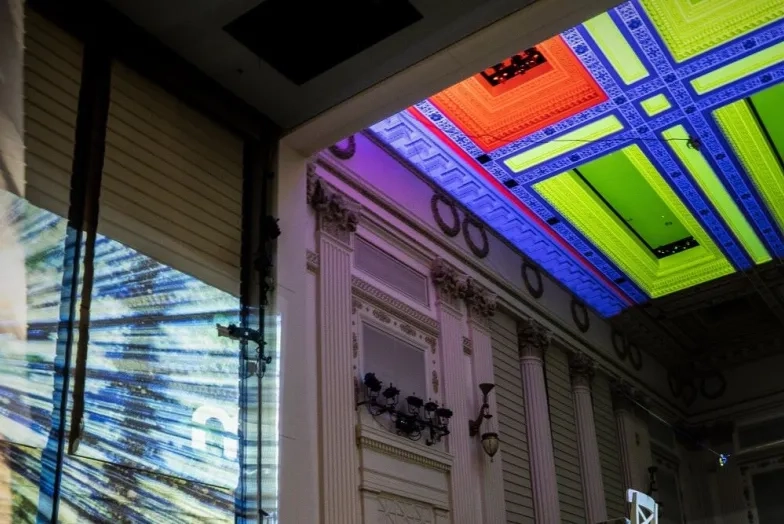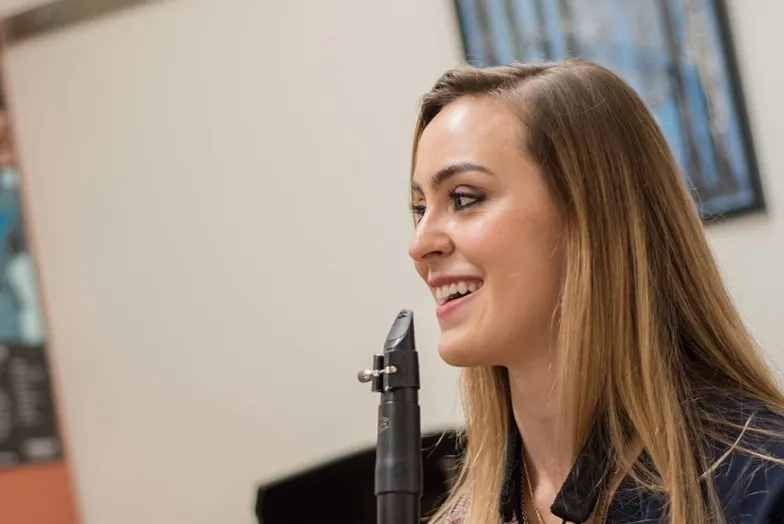Voice Master of Music Curriculum
Life isn’t an audition.
Any music school can make you a better player. Our interconnected courses are built to transform you intellectually, artistically, professionally, and individually. You’ll understand the roots of your music, freeing you to take it somewhere new. You’ll see how your training broadens your options, rather than narrowing them. You'll find your voice. And you'll enter the world with the same confidence you bring to the stage.
Required Courses
Curriculum: Master of Music in Voice
Credit Total: 55
| Requirement | Cr. |
| Private Instruction | 16 |
| Vocal Performance Lab | 2 |
| Musicianship and Music Theory | 0 |
| Music History and Literature | 12 |
| Applied Practical Training | 6 |
| Foreign Language | 6 |
| Professional Development | 2 |
| Ensemble | 6 |
| Electives | 5 |
| Winter Term | 2 Years |
| Juries and Recital | N/A |
The first-year graduate student in voice is required to prepare a full recital for the second semester jury examination, following the general requirements of the senior recital but at a more advanced level. The jury will consist of material selected by the voice faculty from the recital program. At the end of the semester in which students are not doing a jury (usually the fall semester), they may be required to perform a piece chosen by the voice faculty for an evaluation. Students will receive written comments on both evaluation and jury performances.
A public performance of the first-year graduate recital program is optional for students who performed an undergraduate recital as part of their undergraduate degree. If the student has never performed an undergraduate recital, it is recommended that he or she present a solo recital in public as a first-year graduate student, at the discretion of the major teacher. This recital does not require a preview. All first-year graduate students will perform a year-end jury.
Second-year graduate students may be required at the end of the first semester to perform a piece chosen by the voice faculty for an evaluation. A solo recital of 60 to 65 minutes of music is to be presented in public, usually in the second semester. Second-year graduate students who have presented standard repertoire in previous recitals may present recitals comprising repertoire of specialized interest. In close consultation with the teacher, a program can be designed that will satisfy the artistic and educational requirements for the master's degree while not strictly adhering to the senior repertoire guidelines. Some students who do not have much recital performance experience (such as students whose undergraduate degrees were in majors other than music) may, however, benefit by following the guidelines for senior recitals, but at a more advanced level appropriate to graduate studies. The program for the recital, whether specialized or standard, must be approved by the major voice professor, and a portion of the recital may be required to be presented to the voice faculty at least four weeks prior to the recital date during a recital preview. The voice faculty will either approve the memorized recital or ask for a second preview. If the second preview is not approved, the recital must be rescheduled for a later date.
At the time of the preview, materials for the program must be turned in to the major teacher and voice faculty for their review. This must include the recital repertoire (including opus numbers and composers' dates), translations, program notes (limited to 150 words per piece on the program) and an optional biography (limited to 150 words).
The recital preview will be the second-year graduate jury. An exit evaluation will be required at the end of the semester, consisting of one piece chosen by the student.
The second-year graduate student may also perform an optional second recital whose program reflects a special interest. This second recital may not occur until the requirements for the first recital have been fulfilled.
All recital and jury materials are to be prepared under the guidance and with the approval of the major voice professor.



